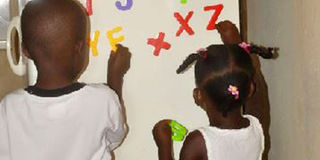Setting limits with children

When children know their boundaries, they will busy themselves. PHOTO BY ISAAC SSEJJOMBWE
What you need to know:
- When you think your child is being unreasonable, there are ways you can set limits for them as Patty Wipfler writes.
- If you can stay close while they cry or storm, they will continue until they have regained their ability to listen, to be cooperative, and to make the best of the situation at hand.
When children are under stress, they lose their patience, their love of fun, their easy going ability to make each day a good one. At these times, they tend to do things that do not make sense.
They will begin to squabble, insist on having things someone else has, or to want one thing after another, without gaining satisfaction.
At times like these, we, parents can play a positive role. We can set limits on our children’s behaviour in order to help them relieve the stress they are under, and regain their innate good judgment and joy in cooperation.
Setting limits with young children takes a bit of practice. When you think your child is being unreasonable, here are the steps to follow.
Listen
Get down so you are at eye level, and simply ask what is going on.
Ask your child to tell you why they are yelling, or why they has to have the blue clothes. They need to talk about the upset they feel, if possible, to someone who is not upset too.
Limit
If they insist on unreasonable behaviour, you must step in. Tell them what you think is reasonable, and then make sure that her unreasonable behaviour does not continue.
If your child is yelling at their sibling, ask them to stop. If they cannot stop, pick them up gently and bring them with you into another room.
If they are throwing toys in anger, put your hand on the toy they are about to throw, and say, “I won’t let you throw that.”
If they are insisting on having a fifth cookie, bring them into your lap, away from the cookies, and tell them, “Not now.” Later, you can have another, but not now. No punishment is needed, no lectures are needed, and no harshness is needed. Simply step in.
Children who are under stress cannot think well. They cannot process what we tell them, so they do not do what we ask.
You must expect this, and step in, gently but firmly, to see that they do not continue to do irrational things.
Step in
This is the “stress release” step—the one that will help your child immensely. After you have stepped in to prevent your child from doing things that do not make sense, they will most likely begin to cry, storm, or tantrum.
This is constructive. It is your child’s way of getting rid of the tension that made them unreasonable in the first place.
If you can stay close while they cry or storm, they will continue until they have regained their ability to listen, to be cooperative, and to make the best of the situation at hand.
What to do
1. Be trustworthy
Your children need to know that they can count on you. When you fail to back up your words with action, your words will cease to mean anything. Your discipline and boundary setting will become hollow.
2. Less is more
Follow the guideline of a special education teacher we know. “Five rules respected 100% of the time are better than 20 rules with haphazard compliance.”
3. Be precise
Effective communication is necessary. Ask them to repeat to you what they heard you say to verify it is understood.
-allprodad.com
-Handinhandparenting.org




